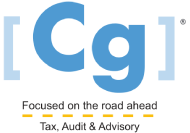As an integral part of investigation into financial irregularities, forensic accounting involves the meticulous examination of financial records, review of data, and application of analytical techniques to unveil fraudulent activities.

Forensic accountants operate in a critical and sensitive space, attempting to find out the truth of matters that have far-reaching consequences. Therefore, they have the responsibility of maintaining integrity, objectivity, and professional conduct throughout their work. At Cg, our firm has been trusted for decades by businesses and individuals for our comprehensive forensic accounting services – contact us today to see how we can assist you, or read further to learn about the standards that forensic accountants follow.
Ethical Principles in Forensic Accounting
It’s easy to assume that financial investigations are composed purely of numbers and spreadsheets, but the field of forensic accounting goes beyond that. Forensic accountants must apply consistent ethical rules to ensure the integrity and effectiveness of their investigations. These include:
-
Integrity and Objectivity
Forensic accountants are committed to acting honestly and objectively, ensuring that their findings remain untainted by personal biases or external pressures. By upholding the principles of integrity and objectivity, they can provide reliable, unbiased analyses that can withstand the most stringent scrutiny in legal proceedings.
-
Professional Competence and Due Care
To truly excel in their role, forensic accountants continually enhance their professional competence and exercise due care. They stay on top of the latest laws, regulations, and industry practices, ensuring that their knowledge and skills are up to date to enable them to effectively identify and investigate fraudulent activities, potentially mitigating harm to innocent people and companies.
-
Confidentiality and Privacy
Forensic accountants handle sensitive financial information during their investigations. Hence, a commitment to maintaining strict confidentiality and respecting privacy is paramount. Forensic accountants must safeguard confidential data, sharing information only with authorized parties. This way, they can foster trust and instill confidence in their clients and contribute to the overall integrity of the investigation process.
-
Professional Behavior and Conduct
Forensic accountants exhibit professionalism in all facets of their work. They embody this idea through their interactions with clients, colleagues, and legal authorities. A forensic accountant should ensure their communication is clear and respectful, that they maintain professional boundaries, and that they diligently avoid conflicts of interest. By adhering to these high standards, they build trust and credibility and preserve the esteemed reputation of their profession.
Professional Standards in Forensic Accounting
You can only be sure a forensic accountant’s services will benefit your business if they hold the correct qualifications and follow the right guidelines. When you work with Cg’s Litigation & Valuation Services group, you can be assured that the team members at your service are highly qualified. Our forensic accountants hold prestigious certifications such as Certified in Financial Forensics (CFF).
Here are some key aspects of professional standards in forensic accounting:
#1. International Standards in Auditing (ISAs)
Forensic accountants rely on ISAs as a framework to conduct their investigations. These globally recognized standards provide guidelines for gathering evidence, assessing risk, and forming professional opinions. Forensic accountants follow ISAs to ensure consistency, quality, and reliability in their methodologies and findings.
#2. Generally Accepted Accounting Principles (GAAP)
The Generally-Accepted Accounting Principles is an accounting standard that serves as the foundation of financial reporting and provides a common language that accountants use to analyze financial statements. Understanding and applying the GAAP standard enables them to identify irregularities, discrepancies, or deliberate misrepresentations in financial records.
#3. Forensic Accounting Standards and Guidelines
In addition to general accounting standards, The Institute of Certified Forensic Accountants recommends specific standards and guidelines forensic accountants must follow. These standards address unique challenges in forensic investigations, such as evidence collection, fraud detection techniques, and the presentation of findings.
#4. Maintaining Expertise
The field of forensic accounting is constantly evolving, and it is essential for forensic accountants to stay updated with the latest developments and techniques by continuously enhancing their knowledge and skills, attending professional development programs, and pursuing relevant certifications.
By following internationally-recognized standards, such as ISAs and GAAP, and embracing specialized forensic accounting standards and guidelines, forensic accountants can maintain a solid foundation for accurate financial analysis, fraud detection, and legal proceedings.
To learn more about the invaluable forensic accounting services our accounting firm offers and how our Cg Litigation & Valuation Services Group can help safeguard the financial integrity of your business or assist you with a matrimonial or divorce accounting matter, contact us today.

